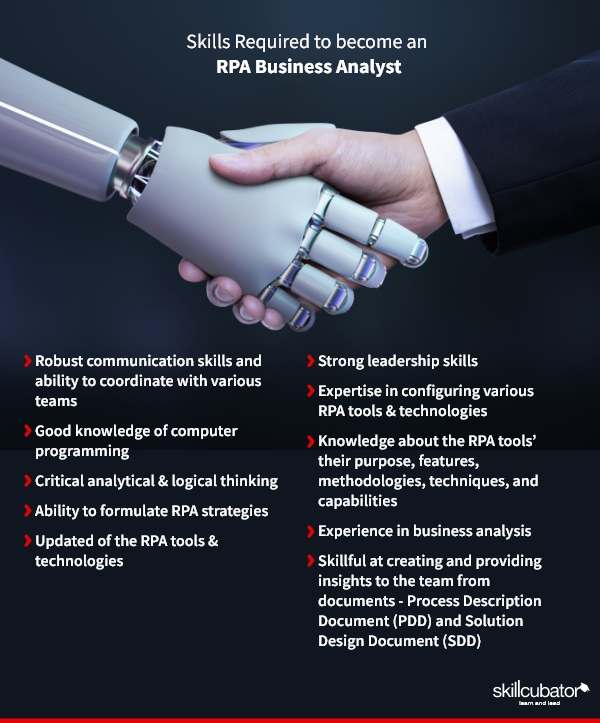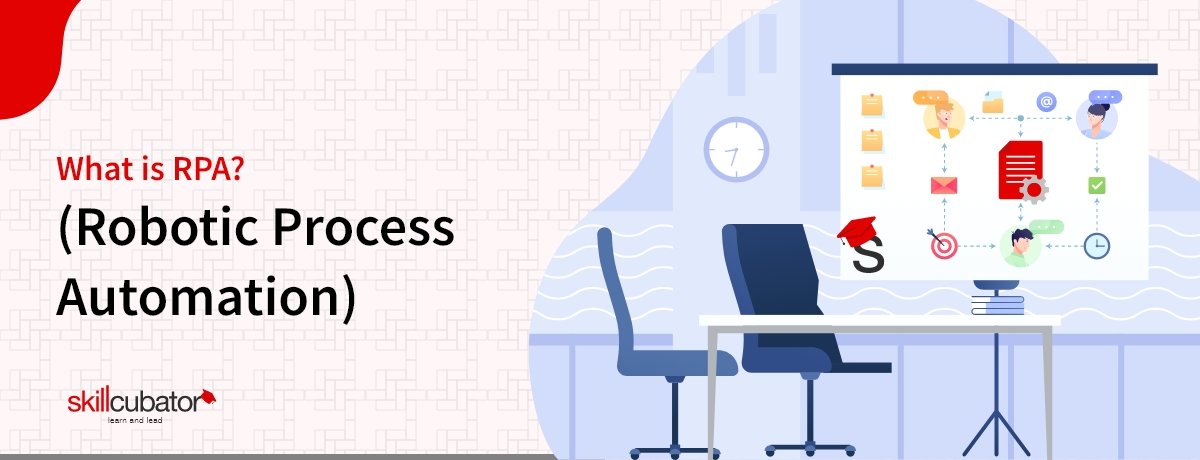What is RPA (Robotic Process Automation)?
Today, ‘automation’ has become the buzzword in various sectors, for which ‘business analysis’ is not an exception. Organizations are going crazy over automating their business processes creating a huge demand for RPA business analyst professionals.
Robotic Process Automation, popularly heard as, RPA, is a software technology used for automating mundane operations such as customer support, employee onboarding, payroll processing, data analysis, and whatnot. The term ‘Robotic’ here doesn’t directly interpret ‘physical robots’ instead refers to the software/application that runs on computers and mobiles.
Here, we’ll walk you through the benefits, responsibilities, skills, use cases, and future scope of an RPA business analyst. Are you looking to build an aspiring career as an RPA business analyst? This blog is for you. Happy reading!
1. Who is an RPA Business Analyst?
An RPA business analyst is an individual who examines the stakeholder/client project’s business process/workflow and looks for potential opportunities to implement RPA solutions.
While you become an RPA analyst, you’ll have to examine the scalability of the workflow architecture in your stakeholder’s project. Based on the requirement, you can advise the stakeholder/end client to automate certain routine tasks through RPA technology.
You’ll need to configure the RPA software and with that the automation game is on, empowering you to focus on other complex operations that require human intelligence. And most importantly, as you embrace automation, no natural calamities, or any other crisis can disrupt the operations.
RPA – Advantages for a Business Analyst
- Improve accuracy
- Quick turnaround time
- Boost productivity
- Easy to manage numerous data
- Reduce workload
Also Read – Most Frequently Used Tools for a Business Analyst
2. Roles & Capabilities of an RPA Business Analyst
Below, we’ve listed a few crucial skillsets and responsibilities of an RPA business analyst. These will help you build a passionate career in the near future!

Key Responsibilities of an RPA Business Analyst
In the initial phase, you’ll have to analyze the current architecture of your stakeholder business. Once the analysis is over, you have to look for opportunities to improve the workflow. For this, you can closely collaborate with the team and listen to their suggestions as well. Then, you can start with documenting the requirements.
Proposing an RPA Strategy
After documentation, your next responsibility is proposing a plan along with a specific turnaround time. The RPA strategy associates the business process opportunities and RPA solutions to improve. You should properly communicate the plan to stakeholders and the development team. With in-depth analysis reports and RPA strategies, you’ll have to suggest a plan. Once getting the approval, you can encourage the team to kickstart the development operations.
Testing the End Result
Once the development is over, the business analyst will assess the quality and confirm if the end product is inline with the initial proposal plan. In the development phase, the developers will configure the RPA tools according to the project requirements. Once testing from your end gets over, you’ve to send the result to the client for review. If there is any feedback from the end client, you’ve to coordinate with the development team and re-work it.
Updating the End Report
After completing the analysis, you’re responsible for documenting and reporting the final results. This involves creating detailed documents such as the Process Distribution Document (PDD) and Solution Design Document (SDD). You’ll have to frequently update the final report to the stakeholders. The documentation will keep everyone involved in the project on the same page.

Skills Required to become an RPA Business Analyst
Robust communication skills and ability to coordinate with various teams
– Good knowledge of computer programming
– Critical analytical & logical thinking
– Ability to formulate RPA strategies
– Updated of the RPA tools & technologies
– Strong leadership skills
– Expertise in configuring various RPA tools & technologies
– Knowledge about the RPA tools’ their purpose, features, methodologies, techniques, and capabilities
– Experience in business analysis
– Skillful at creating and providing insights to the team from documents – Process Description Document (PDD) and Solution Design Document (SDD)
Also Read – Difference between Business Analyst Vs Data Analyst
3. Few Real-time Examples of RPA
Invoice Processing – Extract invoice data, validate it against the organization’s database, and enter it into the accounting system
Customer Support – Extract customer inquiries from various sources and revert
Hiring Process – Get access to the candidate’s details from resumes, schedule interviews, etc.
Finance Management – Automation in account reconciliations, reporting, and budgeting
Marketing & Sales – Automation in lead generation, customer profiling, sales forecasting, and more
Process Mapping – Create process maps from existing business processes, identify inefficiencies, and optimize processes
Data Analysis and Visualization – Extract data from various sources and create visualizations like dashboards, charts, etc., for decision-making
Project Management – Automate project management tasks such as scheduling, resource allocation, and status reporting
Risk Management – Automate risk assessment and management tasks such as identifying potential issues, evaluating risks, and developing mitigation strategies
Quality Control – Automate quality control tasks such as data validation, error detection, and exception handling
Compliance Management – Automate compliance monitoring tasks such as tracking regulatory changes, updating policies and procedures, and generating compliance reports
4. What is the Future Scope of an RPA Business Analyst Career?
RPA is rolling out in the vast and wide industrial space including healthcare, retail, telecommunication, banking & finance, and many more. Owing to the bountiful perks of RPA, businesses & organizations are likely to embrace the technology for managing their less human-dependent routine tasks.
One of the key trends shaping the future of RPA business analysts is the combination of RPA with artificial intelligence (AI) and machine learning (ML) for robust automation solutions.
Another trend to watch is the RPA-based back-office operations and other areas of the organization. As RPA business analysts, you’ll need to broaden your skillset and develop a deeper understanding of business processes across the organization to identify new automation opportunities and deliver maximum value.
The global robotic process automation market size was valued at $2,322.9 million in 2022 and is projected to expand at a CAGR of 39.9% from 2023 to 2030. The results of COVID-19 and the digital transformation age have brought ‘Robotic Process Automation’ to the limelight. And moreover, the RPA software service providers to name a few, UiPath, Blue Prism, Automation Everywhere, etc., also have opened up a broad way of promising career opportunities for business analysts! 🙂
Kickstart Your RPA Business Analyst Career with Skillcubator
The scope of RPA in a business analyst career is incredibly growing! There are many ways to embrace RPA into your service offerings, say, for example, outsourcing to an RPA agency. One of the wisest ways is, signing up for an RPA business analyst training program.
At Skillcubator, we offer both online and offline courses exclusively for RPA business analysis. Sign up for our training today and reap the benefits in the long run! Do not hesitate to reach us
at any time if you’ve any doubts.
